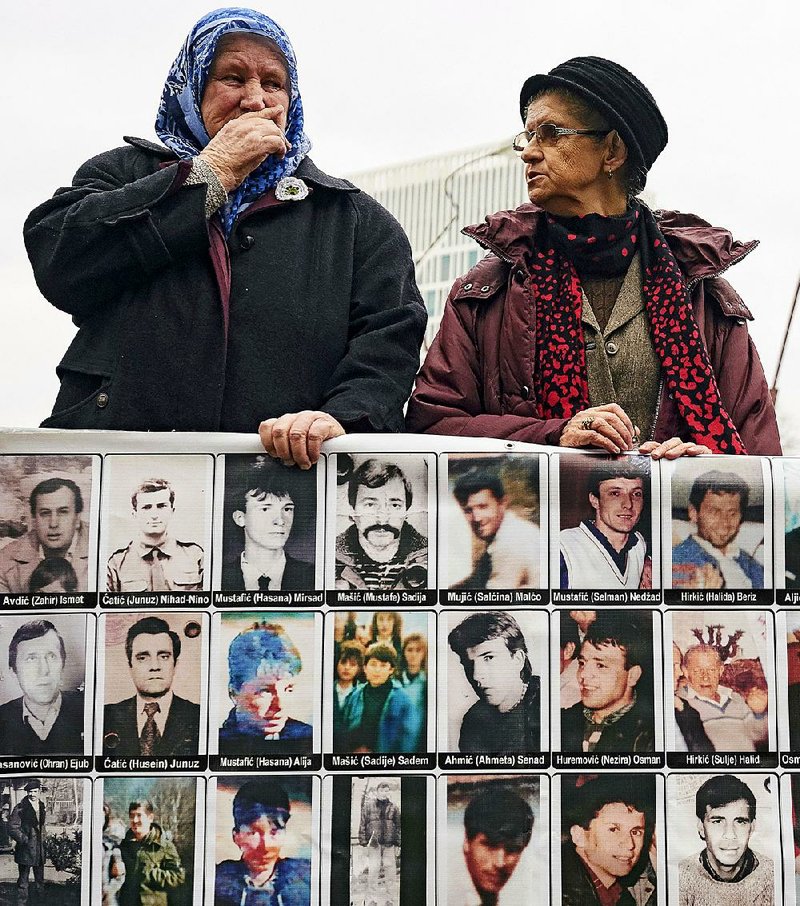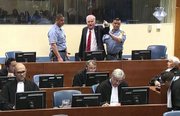THE HAGUE, Netherlands -- Ratko Mladic, a former Serb warlord who commanded forces that carried out some of the worst atrocities of the Balkan wars, was found guilty of genocide and other crimes against humanity by an international tribunal Wednesday.
Mladic, 74, was sentenced to life in prison for his role in the bloodiest chapter of European history since World War II.
His conviction on 10 of 11 counts marks the last major prosecution by the International Criminal Tribunal for the former Yugoslavia, which the U.N. Security Council set up more than two decades ago.
The verdict was hailed as a victory for justice -- even if it was long delayed.
"Mladic is the epitome of evil, and the prosecution of Mladic is the epitome of what international justice is all about," said U.N. human-rights chief Zeid Ra'ad al-Hussein.
Mladic, whose attorneys had sought to block Wednesday's judgment on the grounds that he was too ill to attend trial, had been removed from the courtroom before the verdict was read after an angry outburst in which he shouted insults at the presiding judge, Alphons Orie. Mladic's attorneys said he will appeal the verdict and continued to deny the charges.
"The defense team considers this judgment to be erroneous, and there will be an appeal, and we believe that the appeal will correct the errors of the trial chamber," Mladic lawyer Dragan Ivetic said.
Mladic's son, Darko, said his father told him after the verdict that the tribunal was a "NATO commission ... trying to criminalize a legal endeavor of Serbian people in times of civil war to protect itself from the aggression."
Also at The Hague to witness the verdict were survivors, including those who had been held in concentration camps and mothers who lost their children during a merciless yearslong military campaign against Bosnian Muslims that the court ruled amounted to an extermination attempt.
Survivors applauded and wept as the decision by the three-judge panel was read, with many saying it represented a just punishment for a man dubbed the "Butcher of Bosnia."
Wednesday's decision also was praised by human-rights advocates.
Amnesty International called the sentence a "landmark moment for justice."
The New York-based Physicians for Human Rights, which sent teams to exhume mass graves across the former Yugoslavia and supply crucial evidence to the tribunal, also cheered the decision.
"After more than two decades, today's verdict offers a measure of justice for all those who suffered from Mladic's unconscionable crimes," said Susannah Sirkin, the group's director of international policy and partnerships.
The judgment came after a trial that lasted more than four years and involved testimony from nearly 600 witnesses.
They recounted an array of horrors carried out by forces under Mladic's command during the war in Bosnia from 1992-95, which claimed more than 100,000 lives. The atrocities included sniper attacks, indiscriminate shelling, mass executions and imprisonment in camps where people died of malnourishment and disease.
Orie said in reading the verdict that Mladic's crimes "rank among the most heinous known to humankind."
"Detainees were forced to rape and engage in other degrading sexual acts with one another. Many Bosnian Muslim women who were unlawfully detained were raped," Orie added.
The judge recounted the story of a mother who ventured into the streets during the deadly siege of Sarajevo with her son as Serb snipers and artillery targeted the Bosnian capital. The woman was shot. The bullet passed through her abdomen and struck her 7-year-old son's head, killing him.
Perhaps most horrific, however, was the Mladic-directed July 1995 massacre of more than 7,000 Bosnian Muslim men and boys at Srebrenica, a supposed U.N. haven. Mladic also was convicted of orchestrating the destruction of Sarajevo, the Bosnian capital, through a four-year siege punctuated by shelling and sniper fire.
"Burn their brains!" witnesses reported Mladic, a career military man, shouting as he watched his troops shell Sarajevo.
Mladic, an ultranationalist, viewed the war as a chance for Serbs to avenge hundreds of years of occupation by Muslim Turks. Wednesday's judgment found that he persecuted Croats and Muslims with the intent to create "ethnically clean" territories.
"Circumstances were brutal," Orie said in reading the verdict. "Those who tried to defend their homes were met with ruthless force. Mass executions occurred, and some victims succumbed after being beaten. Many of the perpetrators who had captured Bosnian Muslims showed little or no respect for human life or dignity."
FOUND IN HIDING
The prosecutions of Balkan war criminals are considered the most important war-crimes cases in Europe since the Nuremberg trials of Nazi perpetrators. Of the 161 people indicted by the tribunal on war-crimes charges, none remains at large today.
In many cases, the perpetrators were tracked down after exhaustive international manhunts that extended for a decade or more. Mladic went into hiding in 1997 and was apprehended in 2011, when Serb police found him living in a cousin's village near the Romanian border.
Mladic's conviction follows that of the Serb political leader who took his country to war in Bosnia. Radovan Karadzic was convicted by the tribunal last year of crimes against humanity and was sentenced to 40 years in prison.
The man widely blamed for fomenting wars across the Balkans, former Yugoslav President Slobodan Milosevic, died in his U.N. cell in 2006 before tribunal judges could reach verdicts in his trial.
To this day, the ethnic tensions that Milosevic stoked from Belgrade simmer.
Top Bosnian Serb political leader Milorad Dodik said the tribunal only underscored its anti-Serb bias by convicting Mladic. Dodik said the court was established with the "single purpose" of demonizing Serbs.
"This opinion is shared by all the Serbs," Dodik said, describing Mladic as "a hero and a patriot."
Serbian President Aleksandar Vucic, a former ultranationalist who supported Mladic's war campaigns but now casts himself as a pro-European Union reformer, agreed that the court has been biased against Serbs but added that "we should not justify the crimes committed" by the Serbs.
"We are ready to accept our responsibility" for war crimes "while the others are not," he said.
Although Mladic was cleared on one charge of genocide related to accusations of mass killings in several Bosnian municipalities, he was convicted of the charge as it related to Srebrenica.
The salt-mining town, which supposedly was under the protection of U.N. forces, became a byword for the inability of the international community to prevent ethnic cleansing.
Mladic handed out sweets and offered reassuring words to the town's Muslim children just hours before his forces executed thousands of men and boys there. Many of the victims were shot in the back of the head, their arms bound behind them.
In addition to genocide, Mladic was convicted on numerous other counts, including murder, deliberately causing terror, and taking U.N. personnel hostage. The judgment said his troops had engaged in the rape of Muslim women and girls, the destruction of homes and mosques, and the forced deportation of civilians.
The war broke out in 1992 as the former Yugoslavia collapsed, and regions including Bosnia declared independence. Serb forces initially sought to defend Bosnian Serb territory, but soon spread violence across the country.
For a former prisoner of Serb-run camps in northwestern Bosnia who was in The Hague, the verdict was sweet relief.
Fikret Alic became a symbol of the horrors in Bosnia after his skeletal frame was photographed by Time magazine behind barbed wire in 1992 in a Bosnian Serb camp.
"Justice has won," he said. "And the war criminal has been convicted."
Mladic had looked relaxed as he entered the courtroom Wednesday, smiling and flashing a thumbs-up. But after the judge rejected a request from his attorney for the session to be postponed because the defendant was suffering from high blood pressure, Mladic stood up and began shouting.
"You're lying," he said, as the suit-and-tie-clad former general was escorted from the courtroom.
Mladic then watched on television in an adjacent room as the judge announced his fate.
Information for this article was contributed by Griff Witte and Luisa Beck of The Washington Post; and by Mike Corder, Jovana Gec, Dusan Stojanovic, Sabina Niksic, Amer Cohadzic, Eldar Emric and Angela Charlton of The Associated Press.
A Section on 11/23/2017



